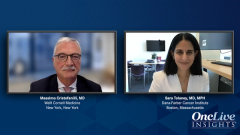
Closing Remarks on Treating Patients with HR+ Breast Cancer
Massimo Cristofanilli, MD, and Sara Tolaney, MD, MPH, offer closing remarks on the HR+ breast cancer treatment landscape, offer advice for community oncologists, and look to the future.
Episodes in this series

Transcript:
Massimo Cristofanilli, MD: I think hormone receptor-positive patients in early oligometastatic breast cancer are the majority of patients who come to the clinic or a community oncologist who treats breast cancer. There are many different studies indicating the importance of risk stratification, molecular assessment, targeted therapy, and different endocrine agents.
I think as was mentioned in one of the questions, ovarian suppression seems to be important for premenopausal patients, keeping in mind that this is a strategy we need to implement. It’s possible for these women who are young also to become pregnant at some point. We saw some of the data at the San Antonio [Breast Cancer Symposium]. There are a variety of issues regarding the treatment of these women. It is not only therapeutic and not only access to new data and new drugs, but also how to deal, especially with a premenopausal woman, who hopefully has a longer life. They need to deal with bone loss, endocrine deprivation, fertility, and so forth. For us who deal with this every day, it is becoming standard, but now a general community oncologist may have so many different diseases to deal with. Breast cancer becomes a unique challenge with a patient who has many different needs.
Sara Tolaney, MD, MPH: It’s becoming complicated even for the academic breast oncologist who only takes care of 1 cancer. Seeing all the data at San Antonio with all the different options, it’s becoming complicated. But to your point, maybe turning to the tools we have, taking advantage of trying to risk stratify by using genomic tools can help both the academic and community oncologists.
In the early stage setting, utilizing things like the 21-gene recurrence score can help with risk stratification up front. Potentially thinking about Ki-67 for the selection of abemaciclib, but I’ll be honest, I tend to do it irrespective of Ki-67 and just look at high-risk features. Then in the metastatic setting, as we discussed, thinking about using the tools like having next-generation sequencing, using a ctDNA [circulating tumor DNA] assay, for example, at the time of progression. That’s what’s going to help us be able to select appropriate therapies for patients. Using those tools hopefully will make things a bit easier.
Massimo Cristofanilli, MD I still hope that one day we’re going to have a specific clinical trial that sequentially addresses the question driven by the cell-free DNA to identify if you change a SERD [selective estrogen receptor degraders] first, if you change a PI3K/AKT inhibitor, how are you going to affect the long-term outcome of this patient without having to go through multiple phase 2 or phase 3 studies? We’ll get to that point, it is just a matter of time. But having all these agents is very important for us when we treat these patients.
Sara Tolaney MD, MPH: That’s exciting. San Antonio showed us there are going to be a lot of options coming our way, particularly post-CDK4/6 [inhibitor], and more to come even in the earlier-line setting.
Thank you for this really wonderful discussion. It was a great opportunity to think about all the new data that have come out. Thank you so much for doing this, and thank you to the audience for listening.
Transcript edited for clarity.




































